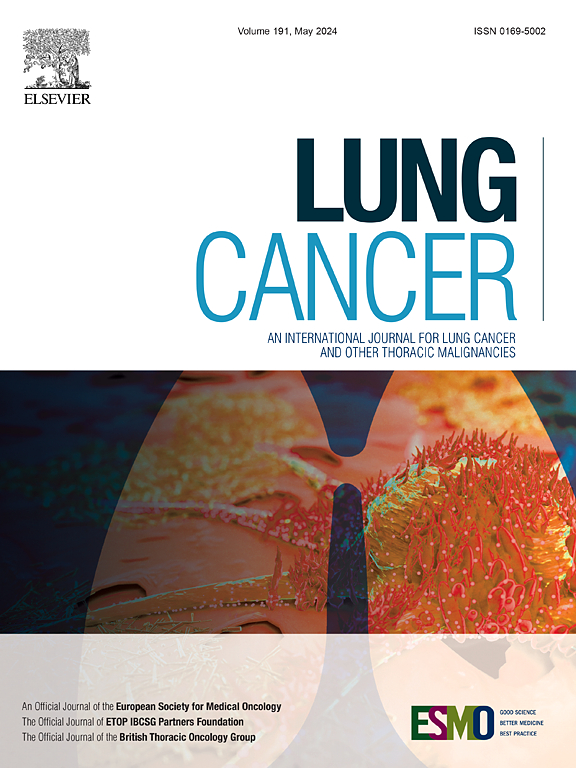可切除的非小细胞肺癌患者的辅助、新辅助和围手术期免疫治疗方案的消耗前瞻性试验的荟萃分析
IF 4.4
2区 医学
Q1 ONCOLOGY
引用次数: 0
摘要
免疫疗法(IOT)在治疗非小细胞肺癌(NSCLC)中的应用已经彻底改变了护理标准。然而,完全遵守新辅助、围手术期和辅助治疗方案仍然是一个挑战。本研究旨在评估基于物联网的方案在新辅助、辅助和围手术期的依从性。方法对截至2024年12月可切除NSCLC的术前、围术期和术后IOT方案前瞻性临床试验进行系统评价和荟萃分析。主要结局包括药物治疗的依从性(例如,遗漏治疗率、不完全治疗率和遗漏手术率)、手术结果(R0切除率)和治疗后严重不良事件(ae)。结果共纳入30项研究,10493例患者。在新辅助的情况下,26项研究(16项新辅助,10项围手术期)研究了IOT单独或联合化疗。几乎所有患者都接受了至少一次治疗,而11.3%的患者经历了不完整的周期。16.1%的病例没有进行手术,80.5%的患者实现了R0切除。67.7%的患者出现≥3级ae。在辅助治疗方面,14项研究评估了IOT(4项辅助治疗,10项围手术期)。9.6%的患者完全不接受辅助治疗,而34.6%的患者需要停药或缩短疗程。19.0%的患者出现≥3级不良事件。新辅助方案的总体方案依从性(效应量:0.78 [IC 95%: 0.70-0.85])优于辅助方案(效应量:0.61 [IC 95%: 0.53-0.69])和围手术期方案(效应量:0.49 [IC 95%: 0.43-0.55])。然而,与术前和术后方案相比,围手术期方案显示出相似的依从性和≥3级AE发生率。结论:对非小细胞肺癌治疗方案的依从性仍然是一个关键因素,特别是对于根治性手术候选人。这项研究在综合可切除的非小细胞肺癌免疫治疗方案依从性的综合数据方面具有里程碑意义。通过量身定制的策略和多学科协调来提高方案的依从性,对于最大化可切除的非小细胞肺癌免疫治疗的治疗潜力和提高患者的预后至关重要。本文章由计算机程序翻译,如有差异,请以英文原文为准。
Attrition with adjuvant, neoadjuvant, and perioperative immunotherapy-based treatment protocols in patients with resectable non-small-cell lung cancer. A meta-analysis of prospective trials
Background
The use of immunotherapy (IOT) in treating non-small-cell lung cancer (NSCLC) has revolutionized care standards. However, full compliance with neoadjuvant, perioperative, and adjuvant treatment protocols remains a challenge. This study aims to evaluate compliance rates with IOT-based protocols in neoadjuvant, adjuvant, and perioperative settings.
Methods
A systematic review and meta-analysis were conducted on prospective clinical trials involving preoperative, perioperative, and postoperative IOT protocols in resectable NSCLC up to December 2024. Primary outcomes included compliance with medical treatment (e.g., omission of therapy rate, incomplete therapy rate, and omission of surgery rate), surgical outcomes (R0 resection rate), and post-treatment severe adverse events (AEs).
Results
A total of 30 studies, with 10,493 patients, were included. In the neoadjuvant settings, 26 studies (16 neoadjuvant; 10 perioperative) investigated IOT alone or in combination with chemotherapy. Almost all patients received at least one therapy administration, while 11.3 % experienced incomplete cycles. Surgery was not performed in 16.1 % of cases, and an R0 resection was achieved in 80.5 % of patients. Grade ≥ 3 AEs were observed in 67.7 % of patients. In the adjuvant setting, 14 studies evaluated IOT (4 adjuvant; 10 perioperative). Complete omission of adjuvant therapy occurred in 9,6 % of patients, while 34,6 % required a discontinuation or cycle reduction. Grade ≥ 3 were AEs observed in 19.0 % of patients. Overall protocol compliance was superior in neoadjuvant protocols (effect size: 0.78 [IC 95 %: 0.70–0.85]) compared to adjuvant protocols (effect size: 0.61 [IC 95 %: 0.53–0.69]) and perioperative protocols (effect size: 0.49 [IC 95 %: 0.43–0.55]). However, perioperative protocols showed similar compliance and Grade ≥ 3 AE rates compared to preoperative and postoperative protocols.
Conclusions
Compliance with treatment protocols in NSCLC remains a critical factor, particularly for radical surgery candidates. This study represents a landmark effort in synthesizing comprehensive data on compliance with immunotherapy protocols in resectable NSCLC. Improving protocol compliance through tailored strategies and multidisciplinary coordination is essential to maximize the therapeutic potential of immunotherapy in resectable NSCLC and enhance patient outcomes.
求助全文
通过发布文献求助,成功后即可免费获取论文全文。
去求助
来源期刊

Lung Cancer
医学-呼吸系统
CiteScore
9.40
自引率
3.80%
发文量
407
审稿时长
25 days
期刊介绍:
Lung Cancer is an international publication covering the clinical, translational and basic science of malignancies of the lung and chest region.Original research articles, early reports, review articles, editorials and correspondence covering the prevention, epidemiology and etiology, basic biology, pathology, clinical assessment, surgery, chemotherapy, radiotherapy, combined treatment modalities, other treatment modalities and outcomes of lung cancer are welcome.
 求助内容:
求助内容: 应助结果提醒方式:
应助结果提醒方式:


